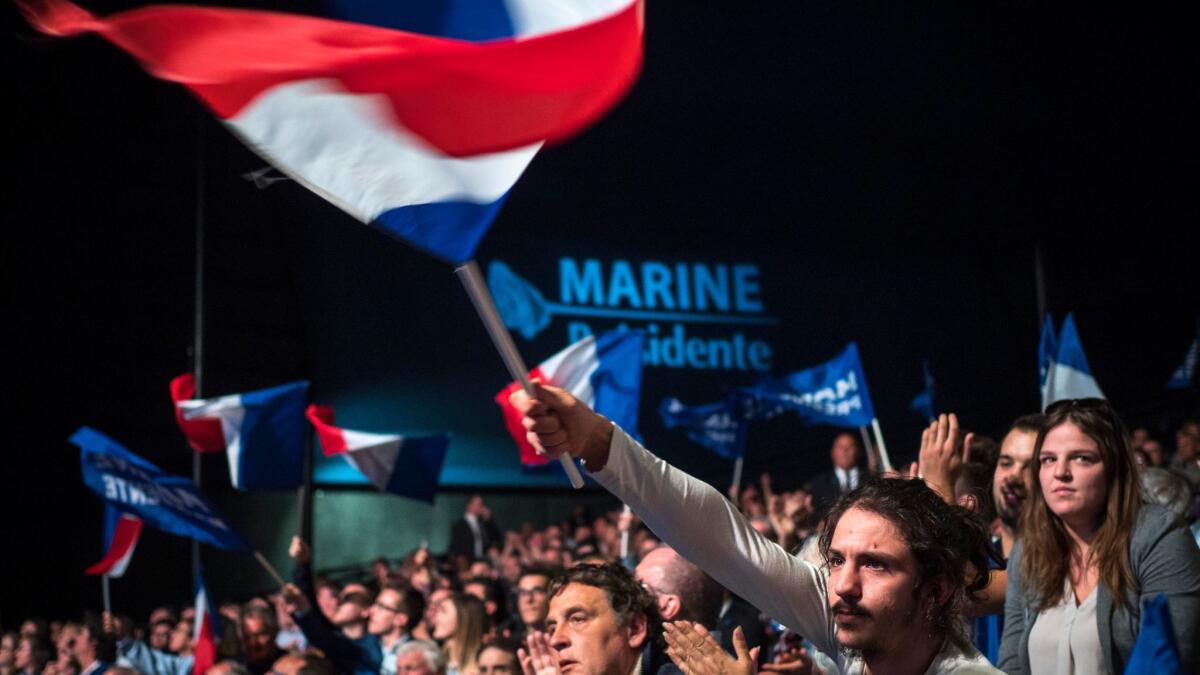Op-Ed: The sorry spectacle of the French presidential election

A far-left candidate’s meteoric rise has given a surrealist hue to the already remarkable French presidential campaign. Heading toward the Sunday election, firebrand radical Jean-Luc Mélenchon is among four top candidates polling within a margin of just 4 percentage points.
The outcome is too close to call. But it’s possible that at least one extremist will reach the May 7 runoff. That both finalists will be populists — one from the radical left and one from the radical right — cannot be ruled out.
Avuncular, loquacious, with a touch of the litterateur about him, Mélenchon, 65, is in fact a soak-the-rich revolutionary who champions Russian President Vladimir Putin and whose political hero is Hugo Chavez, the late Venezuelan leader who ruined his oil-rich South American country — inflation is running at more than 1000% in Venezuela today).
That in a field of 11 candidates, Mélenchon — who wants a top marginal tax rate of 100% — has a following at all, together with far-right National Front candidate Marine Le Pen, shows the farcically low level — the surrealism — of current French political debate.
France’s weak economy, squeezed wages and high debt and deficits may solidify its voters’ embrace of populists.
This is the first time in half a century that one of the two major French parties is not certain to make the second round of a presidential election. It’s also unprecedented that a first-term president has decided not to run for reelection — a clear admission of failure by President François Hollande.
Of the top four candidates, centrist independent Emmanuel Macron is at 22%, according to an Ipsos poll (down 3 percentage points in the last three weeks); Le Pen is also at 22% (and trending slightly downward), while Mélenchon, barely into double figures a month ago, is now at 20%, having just overtaken the scandal-riven establishment conservative, François Fillon, at 19%.
Another opinion poll, by Elabe, may explain the sorry spectacle. After a television debate, viewers were asked which candidate best reflected their preoccupations: Mélenchon came in at the top, with 26% of the respondents connecting with him; Le Pen, 14%, and Philippe Poutou, a Trotskyist outlier, third at 12%.
That 52% of the French said they felt closest to one or another of these anti-establishment candidates shows the extent of what one analyst called the French electorate’s “monumental anger.”
For more than 30 years neither the French left nor the right has managed to reverse the nation’s economic decline, marked by de-industrialization, a rigid labor market, unemployment stuck at around 10% and exploding public spending. The last time the national budget was balanced it was 1974.
Britain and the U.S., countries with close to full employment, chose Brexit and Donald Trump; high-growth Netherlands blocked the ambitions of far-right populist Geert Wilders. Now France’s weak economy, squeezed wages and high debt and deficits may solidify its voters’ embrace of populists who variously reject the European Union, banks, big business, the European Central Bank, a market economy, profits, liberalized trade and German Chancellor Angela Merkel.
Further complicating the mix is the possibility that Fillon may yet rise — precisely because he is at least well-placed to block the populists. France has generally been moving to the right and Fillon, a former prime minister, is viewed as strong on law and order, which resonates given that France remains in a Parliament-declared state of emergency, after 230 deaths and more than 800 injured since 2015 in terrorist attacks.
The big trouble with Fillon, however, is that he presented himself as the presidential-probity candidate and then trashed his own moral example. After media allegations that he paid family members a million euros for work as no-show assistants, he pledged to stand aside if charged over the affair — until he was, in fact, charged over the affair. That his candidacy is at all viable seems incredible, but the threat of the populists is doubtless one reason. Another is probably that, as corruption watchdog Transparency International has pointed out, 1 in 6 French parliamentarians employ family members.
Fillon is another admirer of Putin, so if he rather than Macron should make it to the final vote against one of the populists, one wonders who Putin’s hackers will be looking to help. If two populists win, though, there will be a political earthquake in France, with major ramifications for Europe and beyond.
Journalist Richard Ogier was a press attache at the Australian Embassy in Paris.
Follow the Opinion section on Twitter @latimesopinionand Facebook
More to Read
A cure for the common opinion
Get thought-provoking perspectives with our weekly newsletter.
You may occasionally receive promotional content from the Los Angeles Times.






